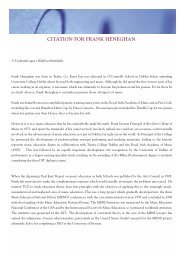TWICE THE SIZE - DIT Update - Dublin Institute of Technology
TWICE THE SIZE - DIT Update - Dublin Institute of Technology
TWICE THE SIZE - DIT Update - Dublin Institute of Technology
Create successful ePaper yourself
Turn your PDF publications into a flip-book with our unique Google optimized e-Paper software.
2.2.3 The facilitation <strong>of</strong> collaborative stakeholders<br />
One <strong>of</strong> the key requirements for the success <strong>of</strong> such a process is ensuring that a broad range <strong>of</strong><br />
stakeholders representing diverse sectors in the city is involved. There are a number <strong>of</strong> reasons<br />
why the collaboration <strong>of</strong> stakeholders is so important.<br />
Only visions developed in a process involving representatives <strong>of</strong> all sectors are seen as<br />
common visions, and therefore, having a greater chance <strong>of</strong> being implemented.<br />
The involvement <strong>of</strong> stakeholders, who will be charged with the implementation <strong>of</strong> the<br />
vision, helps to create a feeling <strong>of</strong> ownership.<br />
The Prospective Through Scenarios methodology provides a platform for discussion about<br />
the future <strong>of</strong> a given city and its region, and enables stakeholders to find a common<br />
language and shared platform for talking and acting in a concerted manner.<br />
One <strong>of</strong> the initial steps for each gateway was the identification <strong>of</strong> three or four local champions.<br />
It is crucial for the project to gain the trust and support <strong>of</strong> local leaders, and for them to<br />
develop a good understanding <strong>of</strong> the aims <strong>of</strong> the exercise and the methodology. This was<br />
achieved in collaboration with the Urban Forum. Having ‘local champions’ on board helped to<br />
raise local interest in the project and foster participation.<br />
The representatives <strong>of</strong> the sectors listed below in Figure 5 were identified and invited to<br />
participate in the study.<br />
local and regional<br />
government<br />
community groups<br />
architects, planners<br />
and engineers<br />
business community<br />
developers politicians<br />
media education, health and<br />
justice<br />
Figure 5: Sectors invited to participate in the study.<br />
38<br />
religion and arts<br />
Expert facilitation <strong>of</strong> the workshops is one <strong>of</strong> the key conditions in ensuring continuity,<br />
consistency and a uniform structure in developing visions for the different city-regions<br />
participating in the project. Experience gathered through previous projects shows that the level<br />
<strong>of</strong> expert facilitation can contribute significantly to the success or failure <strong>of</strong> such a project. The<br />
Futures Academy facilitators orchestrated the workshops and conducted strategic interviews.<br />
The facilitators were not only the experts in the application <strong>of</strong> the Prospective Through<br />
Scenarios methodology, but also had an extensive knowledge <strong>of</strong> issues related to urban futures.<br />
Their knowledge <strong>of</strong> the examined problem was important in ensuring that none <strong>of</strong> the important<br />
trends and aspects were overlooked throughout the project.








